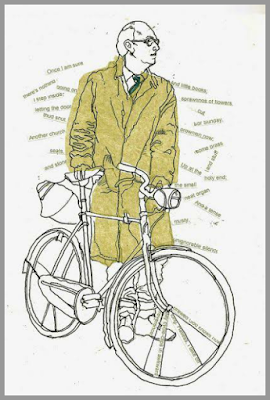
This image is taken from pinterest.com
[ The Whitsun Weddings by Philip Larkin ]
That Whitsun, I was late getting away:
Not till about
One-twenty on the sunlit Saturday
Did my three-quarters-empty train pull out,
All windows down, all cushions hot, all sense
Of being in a hurry gone. We ran
Behind the backs of houses, crossed a street
Of blinding windscreens, smelt the fish-dock; thence
The river’s level drifting breadth began,
Where sky and Lincolnshire and water meet.
All afternoon, through the tall heat that slept
For miles inland,
A slow and stopping curve southwards we kept.
Wide farms went by, short-shadowed cattle, and
Canals with floatings of industrial froth;
A hothouse flashed uniquely: hedges dipped
And rose: and now and then a smell of grass
Displaced the reek of buttoned carriage-cloth
Until the next town, new and nondescript,
Approached with acres of dismantled cars.
At first, I didn’t notice what a noise
The weddings made
Each station that we stopped at: sun destroys
The interest of what’s happening in the shade,
And down the long cool platforms whoops and skirls
I took for porters larking with the mails,
And went on reading. Once we started, though,
We passed them, grinning and pomaded, girls
In parodies of fashion, heels and veils,
All posed irresolutely, watching us go,
As if out on the end of an event
Waving goodbye
To something that survived it. Struck, I leant
More promptly out next time, more curiously,
And saw it all again in different terms:
The fathers with broad belts under their suits
And seamy foreheads; mothers loud and fat;
An uncle shouting smut; and then the perms,
The nylon gloves and jewellery-substitutes,
The lemons, mauves, and olive-ochres that
Marked off the girls unreally from the rest.
Yes, from cafés
And banquet-halls up yards, and bunting-dressed
Coach-party annexes, the wedding-days
Were coming to an end. All down the line
Fresh couples climbed aboard: the rest stood round;
The last confetti and advice were thrown,
And, as we moved, each face seemed to define
Just what it saw departing: children frowned
At something dull; fathers had never known
Success so huge and wholly farcical;
The women shared
The secret like a happy funeral;
While girls, gripping their handbags tighter, stared
At a religious wounding. Free at last,
And loaded with the sum of all they saw,
We hurried towards London, shuffling gouts of steam.
Now fields were building-plots, and poplars cast
Long shadows over major roads, and for
Some fifty minutes, that in time would seem
Just long enough to settle hats and say
I nearly died,
A dozen marriages got under way.
They watched the landscape, sitting side by side
—An Odeon went past, a cooling tower,
And someone running up to bowl—and none
Thought of the others they would never meet
Or how their lives would all contain this hour.
I thought of London spread out in the sun,
Its postal districts packed like squares of wheat:
There we were aimed. And as we raced across
Bright knots of rail
Past standing Pullmans, walls of blackened moss
Came close, and it was nearly done, this frail
Travelling coincidence; and what it held
Stood ready to be loosed with all the power
That being changed can give. We slowed again,
And as the tightened brakes took hold, there swelled
A sense of falling, like an arrow-shower
Sent out of sight, somewhere becoming rain.
Summary of The Whitsun Weddings
Whitsun Day is the one day of the year in which the marriage tax is declared null by the British government, thus affording 24 hours of relief to those couples unable to get hitched due to dire economic circumstances. It is on that day that the speaker of "The Whitsun Weddings" has been forced to take a later train than the usual one he rides. It is almost 1:30 on an unpleasantly hot Saturday afternoon when the quarter-full train pulls from the station. As the train takes off, a panorama of the backside of homes, a fishing dock and a river are can be seen through the open windows.
As the afternoon wears on and the train speeds through the countryside, these sites are replaced by stretches of farmland, industrial canals and another town that looks like the last one. What the speaker doesn’t take much notice of as the train is moving are the weddings that are taking place as a result of the holiday. The bright afternoon sun throws its light on certain scenes, while others remain hidden in the shade. Only when the movement comes to a stop at each station is the speaker given enough time to pay attention to the weddings.
The first thing that strikes him is the loudness that these weddings produce. The second thing he notices is how the brides and their maids try to copy the latest fashions, but succeed only in becoming parodies of style. His next thought is how all the mothers of the brides share the common physical trait of being overweight; how yellow, purple and green are the hot colors of the moment; and how every single wedding party seems to include a dirty-minded uncle somewhere. Cafes, banquet halls and yards all serve well for stringing the bunting and hosting the party. And then, amid a hail of confetti and last minute advice, the bride and groom were waved goodbye on the train platform.
As the train makes its way closer to London, the landscape grows more urban in atmosphere and a dozen more marriages will take place before the speaker arrives. As the train begins to move well past being only a quarter full, the speaker ponders how none of the grooms and their brides ever stop to contemplate how they will share something with each of the other newly wedding couples for as long as their marriage lasts.
The light, but unavoidably apparent sense of scorn toward the bridal parties that the speaker has expressed in his thoughts undergoes an ironic shift as the train pulls into the station. London’s industrial dark suddenly takes on a sense of magic as he realizes that the collection of so many newly married couples has given a meaning to the coincidence that has brought them all together in the same. Amid imagery of arrows, showers and rain, the full significance of the massive potential for all the fertility to come together and change the world overwhelms his previous cynical attitude.








0 Comments
Have a good day.